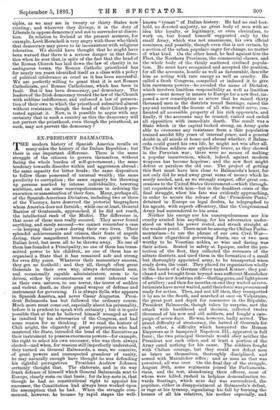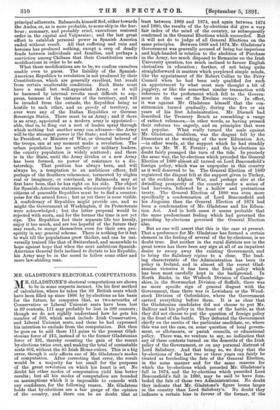EX-PRESIDENT BALMACEDA. T HE modern history of Spanish America, recalls on
many sides the history of the Italian Republics ; but there is one important difference. There is the same struggle of the citizens to govern themselves, without facing the whole burden of self-government ; the same tendency towards disorder within and aggression abroad ; the same capacity for bitter feuds ; the same disposition to follow those possessed of unusual wealth ; the same proclivity to corruption ; the same capacity for throwing up persons marked by intense individuality, towering ambition, and an utter unscrupulousness in ordering the execution or assassination of their foes. Many, perhaps all, of the Spanish-American Dictators, including two or three of the Viceroys, have deserved the pictorial biographers whom America does not furnish ; while one at least, General Barrios of Guatemala, approached, if he did not reach, the intellectual rank of the Medici. The difference is. that none of these men really succeed. They never found anything, and rarely succeed—we cannot remember a case —in keeping their power during their own lives. Their splendid achievements and crimes, their feats of superb daring, their magnificent treacheries, rise quite to the Italian level, but seem all to be thrown away. No one of them has founded a Principality, no one of them has trans- mitted power to his children,. no one of them has so organised a State that it has remained safe and strong for even fifty years. Whatever their momentary success, they get no foothold ; and they all, though often great Generals in their own way, always determined men, and occasionally capable administrators, seem to be driven, either by circumstances or some inherent vice in their own natures, to use terror, the terror of sudden and violent death, as their grand weapon of defence and instrument for governing. It is always Sylla who appears in Spanish America, and never Caesar Augustus. Presi- dent Balmaceda has but followed the ordinary course. Much more must come out, especially about his personality, before it is prudent to speak with certainty ; but it is quite possible that at first he believed himself wronged as well as insulted by his adversaries of the Congress, and had some reason for so thinking. If we read the history of Chili aright, the oligarchy of great proprietors who had mastered the State, intended the head of the Executive as their instrument to possess enormous powers—for example, the right to select his own successor, who was then always elected—and when, for reasons still imperfectly understood, they turned on General Balmaceda, a man, we conceive, of great powers and unsuspected grandeur of vanity, he may naturally enough have thought he was defending his rightful prerogatives. President Andrew Johnson certainly thought that. The elaborate, and in its way frank defence of himself which General Balmaceda sent to Europe, clearly rests on that basis ; for its key-note is, that though he had no constitutional right to appoint his successor, the Constitution had always been worked upon the assumption that he had. When the struggle com- menced, however, he became by rapid stages the well- known " tyrant " of Italian history. He had no real foot- hold, no devoted majority, no great body of men with an idea like loyalty, or legitimacy, or even clericalism, to work on, but found himself supported only by the small Army, which was not unanimous, his own official nominees, and possibly, though even this is not certain, by a section of the urban populace eager for change, no matter of what kind. On the other hand, he had against him the Fleet, the Northern Provinces, the commercial classes, an4 the whole body of the thinly scattered civilised popula- tion. He must have recognised and accepted the position, for all the accounts, hostile as well as favourable, describe him as acting with rare energy as well as cruelty. He called a fresh Congress, compelled or induced it to give him enormous powers—he avoided the name of Dictator, which involves limitless responsibility as well as limitless power—sent money in masses to Europe for a new fleet, im- posed a new conscription so severe that he raised thirty thousand men in the districts round Santiago, raised the pay and increased the license of all who would serve, con- fiscated all accessible property of his rich opponents, and finally, if the accounts may be trusted, visited and ended all opposition with immediate death. The result was a State which in the. capital looked strong, an Army quite able to overcome any resistance from a thin population trained amidst fifty years of internal peace, and a general' doubt in all minds at home and abroad whether, if Balma- ceda could guard his own life, he might not win after all. The Chilian soldiers are splendidly brave, as they showed in the Peruvian war ; there were no means of making a popular insurrection, which, indeed, against modern• weapons has become hopeless ; and the new fleet might defeat or paralyse the old one. The project of getting this fleet must have lain close to Balmaeeda's heart, for• not only did he send away great sums of money which he sorely needed, and, as we strongly suspect, offer great con-. cessions to the United States Government—which through- out coquetted with him—but in the deadliest crisis of the final struggle, when his fate was evidently approaching, in order to secure the release of the ' Presidents Pinto,' detained in Europe on legal doubts, he telegraphed to- his agents, with superb effrontery, that the Congressional Army had surrendered to his arms.
Neither his energy nor his unscrupulousness nor his- cruelty availed him anything, for his 'adversaries under- stood on what his power rested, and struck straight at the weakest point. There must be among the Chilian Parlia- mentarians—to use the phrase of our own Civil War— and their oligarchical governing Junta, one or two men worthy to be Venetian nobles, so wise and daring was their action. Seated in safety at Iquique, under the pro- tection of the fleet, they collected the revenues of the nitrate districts, and used them in the formation of -a small. but thoroughly appointed army, to be transported when ready down the coast. They placed its organisation wholly in the bands of a German officer named Korner ; they pur- chased and brought from beyond seas sufficient Mannlicher- rifles—the new Austrian rifle—Gatling guns, and light pieces. of artillery; and then for months on end they waited as revo- lutionists have never waited, until their force was pronounced ready for action. Then, and not till then, they transported it by sea to the South, and marched at once on Valparaiso, the great port and depot for commerce in the Republic. President Balmaceda, though taken by surprise, met the attack with hardihood and decision, collected twelve thousand of his new and old soldiers, and fought a cam- paign of seven days. He was, however, badly served. The grand difficulty of stratocracy, the hatred of Generals for each other, a difficulty which hampered the Roman Emperors as it hampered Napoleon III., appeared in full force ; the two principal Generals would obey neither the President nor each other, and at least a portion of the Army cared nothing for his cause. The soldiers fought with Chilian courage, but they could not defeat men as brave as themselves, thoroughly disciplined, and armed with Mannlicher rifles ; and as soon as that was perceived, all was over. On the final day of the struggle, August 30th, some regiments joined the Parliamenta- rians, and the rest, abandoning their officers, most of whom were killed, rushed in helpless demoralisation to- wards Santiago, which next day was surrendered, the populace, either in disappointment at Balmaceda's defeat, or rage at his tyranny, signalising his fall by burning the houses of all his relatives, his mother especially, and the Andes, or, as is more probable, to some ship in the har- bour; summary, and probably cruel, executions restored order in the capital and Valparaiso ; and the last great effort to establish personal power in Spanish America ended without result. All that suffering and ruin and heroism has produced nothing, except a crop of deadly feuds between individuals and families, and perhaps a conviction among Chilians that their Constitution needs modifications in order to be safe.
What those modifications are to be, we confess ourselves unable even to guess. The liability of the Spanish- American Republics to revolution is not produced by their Constitutions, which are generally excellent, but result from certain unalterable conditions. Each State must have a small but well-appointed Army, or it will be harassed by internal revolts most difficult to sup- press, because of the vastness of the territory, and will be invaded from the outside, the Republics being as hostile to each other, and as greedy of territory, as ever were any of the Italian Republics or German Sovereign States. There must be an Army ; and if there is an army, appointed as a modern army is appointed— able, that is, to fling out a sort of leaden spray through which nothing but another army can advance—the Army will be the strongest power in the State ; and its master, be he President, or Minister of War, or General beloved of the troops, can at any moment make a revolution. The urban population has no artillery or military leaders, the country population is widely scattered ; and there is in the State, until the Army divides or a new Army has been formed, no power of resistance to a dic- tatorship. That position has always been, and will always be, a temptation to an ambitious officer, full perhaps of the Southern vehemence, tormented by slights real or imaginary, or convinced, as Balmaceda may at first have been, that he has right on his side. The object for Spanish-American statesmen who sincerely desire to be citizens of peaceable Republics must be to find a counter- poise for the armed force ; but as yet there is none visible. A confederacy of Republics might provide one, and so might the Government of Washington, if its Protectorate were acknowledged ; but the latter proposal would be rejected with scorn, and for the former the time is not yet ripe. The Republics feel their separate life too keenly, enjoy it too much, and are too hopeful of the future they may reach, to merge themselves even for their own pro- sperity in any general scheme. There is nothing for it but to wait till the populations grow thicker, and can be uni- versally trained like that of Switzerland, and meanwhile to hope against hope that when the next ambitious Spanish- American General feels inclined to dictate to his Republic, his Army may be in the mood. to follow some other and more law-abiding man.



































 Previous page
Previous page